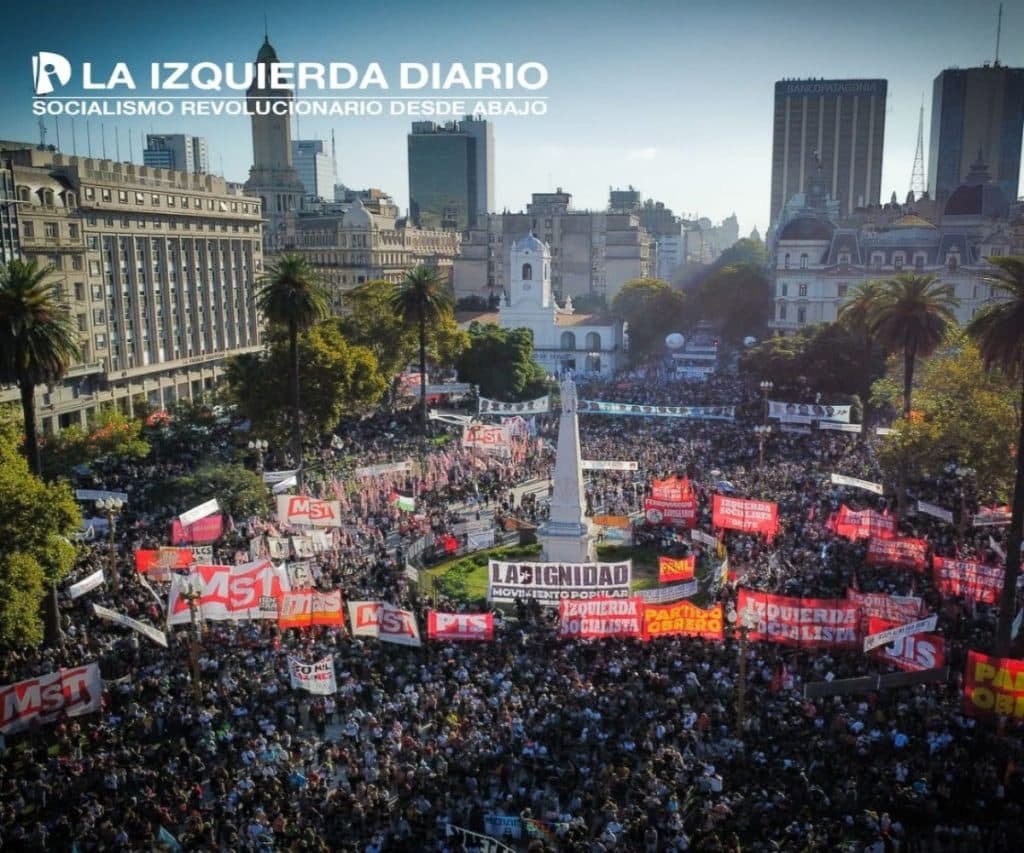This Sunday, March 24, tens of thousands of people filled the streets of Buenos Aires and Argentina’s biggest cities to demand “memory, truth, and justice” for the victims of state violence. This annual day of action is held in remembrance of the 30,000 people who were disappeared, murdered, or tortured during the military dictatorship of 1976 to 1983, whose atrocities are most recognizably embodied in the figure of Jorge Rafael Videla, the leader of the military junta that seized control of the government. This year, the march had renewed relevance in light of the explicit denialism advanced by the government of far-right president Javier Miliei, especially in the last several weeks. Sunday’s mobilizations also occurred in a context of increased struggle and resistance against the government’s austerity measures.
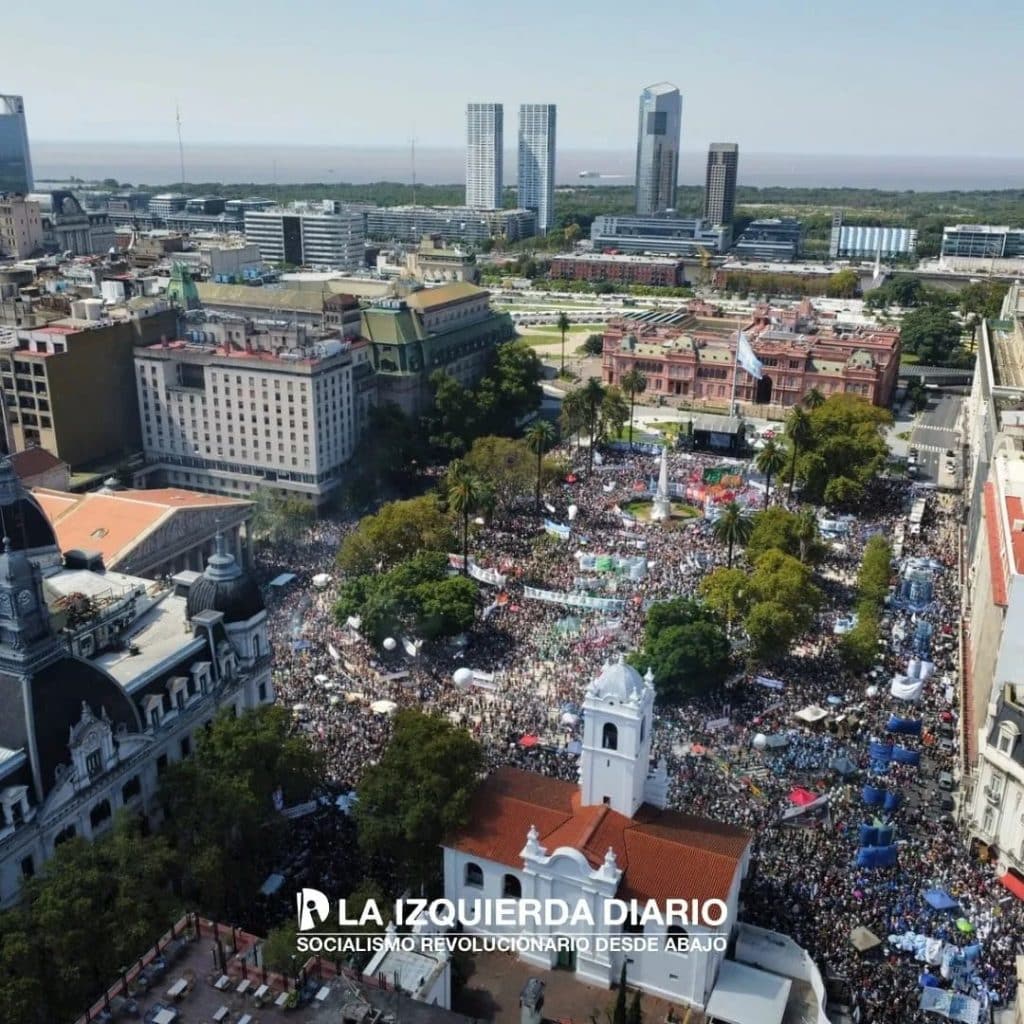
During the rise and seizure of power by the military junta from 1974 to 1983, the state crushed an entire generation of activists, young people, and workers who fought to build a society free from exploitation and oppression and who gave their lives in the struggle for liberation. As part of the Condor Plan, the Argentinian dictatorship systematically organized the political disappearance of thousands of activists who had been at the forefront of the great mobilizations of the 1970s in the country. It carried out this large-scale project of state-sponsored violence with the political, economic, and military support of the United States and other imperialist powers.
This year, the march takes on new dimensions in the era of Milei. Argentina faces an acute economic crisis that is drastically eating away at the living conditions of the working class and poor in Argentina and which has accelerated in recent years and over the course of several administrations. Each successive government — right and left alike — has organized austerity measures in the interests of major international and national economic companies and according to the draconian measures imposed by the IMF.
With Milei’s rise to power, these attacks have multiplied. In just the first three months of his presidency, and despite suffering several significant setbacks in the implementation of his program, Milei has managed to explode the poverty rate, which has risen from 45 percent to 57 percent. Added to this is the massive devaluation of wages, high inflation, budget cuts, and layoffs in the public sector. The government has also made the privatization and de-funding of state-owned companies a cornerstone of its economic “chainsaw” plan, moving to privatize Aerolinas Argentinas and closing Argentina’s state news agency, Télam — measures which have already resulted in layoffs.
March for Justice amid Denialism and Austerity
Facing significant setbacks in its agenda — from the defeat of the Omnibus Law to the Senate voting to block an emergency decree that would unleash hundreds of attacks against the working class and poor — Milei’s government has launched a campaign to deny the atrocities of the dictatorship. The government is preparing a potential project to release members of the dictatorship who are currently in prison; meanwhile, Milei and vice president Victoria Villarruel (whose grandfather and uncle took part in the vicious crimes against humanity perpetrated by the dictatorship) have made increasingly outrageous statements denying the crimes of the army, blaming the “Left” for the violence, and challenging the number of disappearances and deaths during the junta’s rule.
On Sunday, the government published a 12-minute video repeating these lies. In the video and on social media, Milei’s government is calling for a day for “complete memory” that celebrates “the other dead,” revitalizing an old right-wing argument that the dictatorship was necessary to respond to the “terrorism” of the extreme left and Peronist organizations. As Daniel Satur points out in La Izquierda Diario:
This is the first time in 40 years of constitutional governments that the decision was made from the Casa Rosada to go against all national and international jurisprudence, as well as the reconstruction of the historical truth that has been reflected in countless judicial rulings, academic research, books, films, and documentation accumulated over decades by human rights organizations (national and international) and State institutions that agree that there was a genocide in Argentina.
The Milei government’s video features testimonies of family members of the military who were the “victims” of guerrilla groups, fostering lies about the period of the dictatorship and obfuscating the violence perpetrated by the state to quell class struggle and decimate the Left. Of course, this discourse is not entirely new. Before Milei, the governments of Raúl Ricardo Alfonsín, Carlos Menem, and, later, Mauricio Macri each sought impunity for those responsible for the dictatorship in an attempt to reconstruct “respectability” for an army that was deeply delegitimized by its crimes and to stoke the fears and anger of sectors of a profoundly reactionary social base.
The Forces in the Streets Overtake the “Forces of the Skies”
This year, like every year, two different sectors put out two distinct calls for the march. One sector is made up of organizations linked to the center-left Peronist political force. The other sector is called by the Encuentro Memoria, Verdad y Justicia (Coalition for Memory, Truth, and Justice) which includes human rights organizations, as well as combative and far-left unions and workers organizations. The coalition demands the opening of all state archives (still inaccessible today), in particular those that identify the people responsible for the political disappearances, the kidnappings of the 500 missing children, and the crimes that were prosecuted after the fall of the dictatorship.
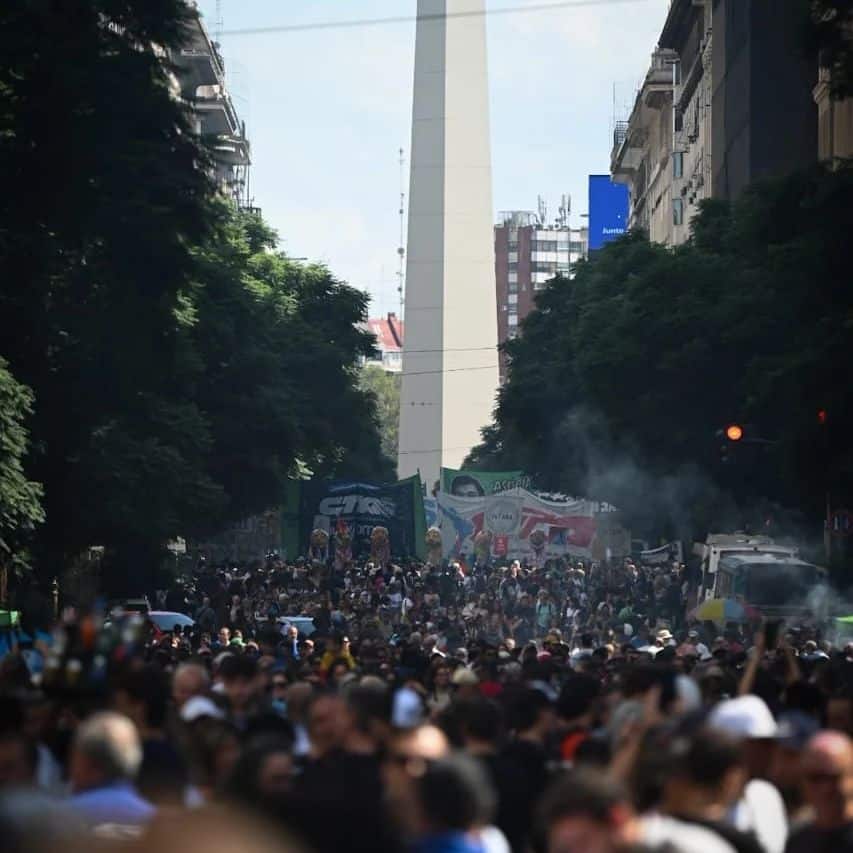
The tens of thousands of people who took to the streets on Sunday explicitly raised demands against the far-right government and the massive attacks launched against the working class and poor. Though both sectors spoke out against Milei, the sectors linked to Peronism and its political parties and figures ignored their own complicity in the government’s attacks. They ignored the conciliatory role being played by the leaderships of the country’s largest unions, the CGT and the CTA, who have refused to call any further actions after the January 24 strike to fight Milei’s austerity, instead preferring to negotiate with the government and rely on the courts.
In contrast, the other sector of the march drew in those who are organizing the fight against the Far Right and austerity and who have no illusions in the “progressive” governments that provide left cover for these policies. Human rights organizations, the Left, student and university organizations, as well as workers organizations flocked to the center of Buenos Aires, shouting “Son 30,000!” (in reference to the 30,000 people disappeared during the dictatorship) and “paro, paro, paro general!” (general strike!).
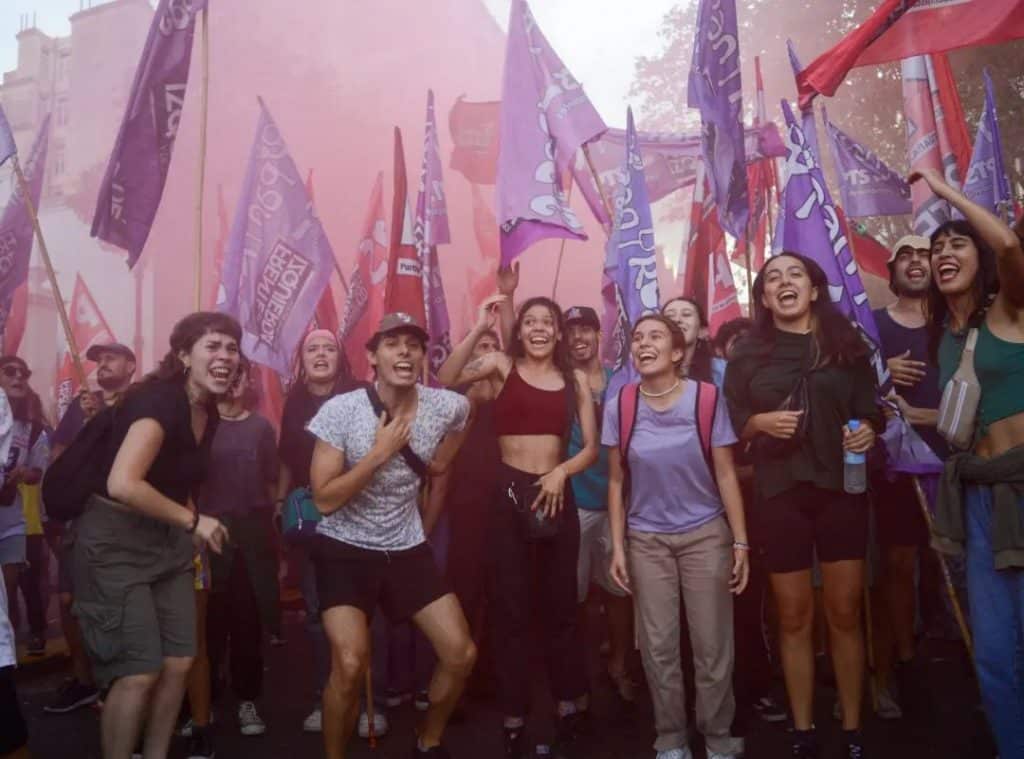
While the big union federations sit on the sidelines, sectors of the working class are defying Milei’s government, with significant mobilizations and protests by workers in sectors under attack by the government, including those in education, healthcare, arts and culture, and transportation. The workers of GPS-Aerolíneas Argentinas participated in the march, alongside workers in the worker-controlled factory Madygraf, teachers and education workers, arts workers from the Instituto Nacional de Cine y Artes Audiovisuales, precarious researchers from CONICET (National Scientific and Technical Research Council), and healthcare workers.
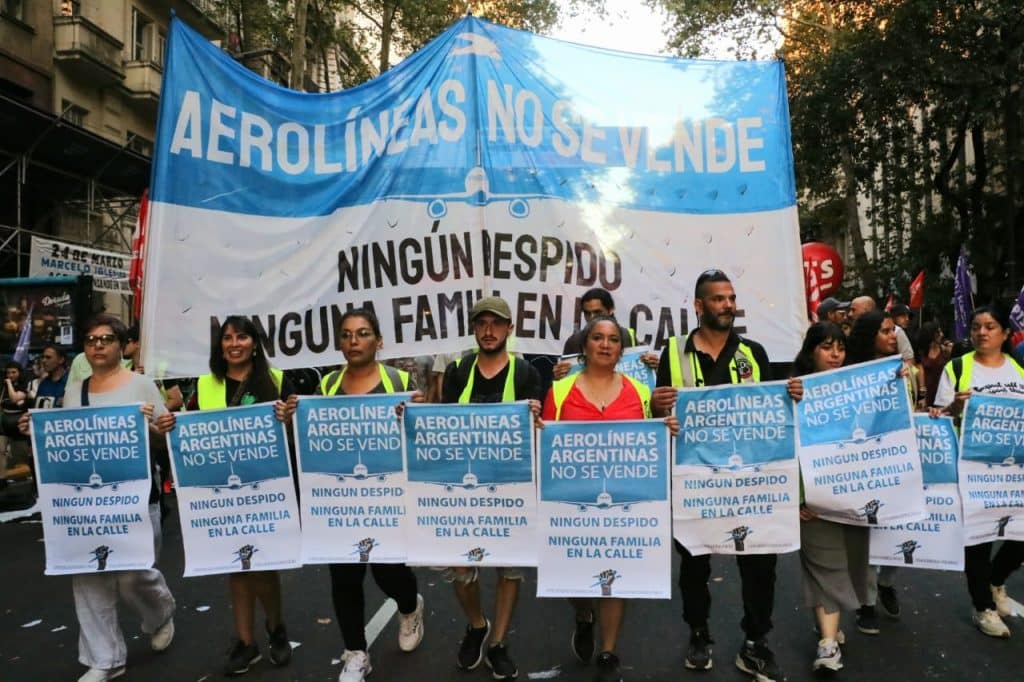
Forming a large contingent in the march were the neighborhood assemblies, which emerged in the weeks after Milei’s election to organize resistance to the government’s policies. These assemblies draw sectors of the youth, retired people, and working class together to democratically debate the path forward for the struggle against Milei. They are playing a central role in organizing the struggle against the government and imperialist austerity, serving as independent bodies that organize from below, defying and challenging the union leaderships and organizations that are standing silently by as the Far Right grows. These leaderships instead rely on capitalist politicians in the Senate to negotiate better conditions for the exploitation and oppression of the working class and poor.
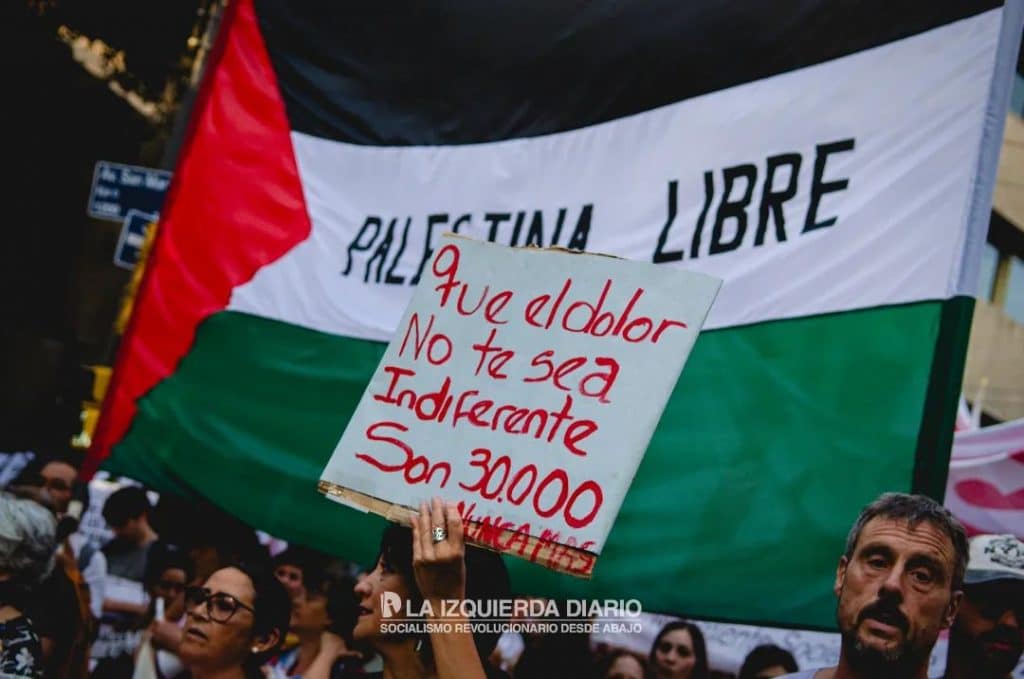
Against impunity for the crimes of the dictatorship and its defenders, the Congresspeople representing the Workers Left Front (FIT-U) also marched with the independent sector of the mobilization, standing with those who are fighting from below against the government’s policies and for the rights of the working class and oppressed. As congressperson and member of Left Voice’s sister organization el Partido de Trabajadores Socialistas (PTS), Myriam Bregman — who is also a human rights lawyer who worked to hold the perpetrators of the dictatorship responsible for crimes against humanity — said, they march because “impunity generates more impunity.”
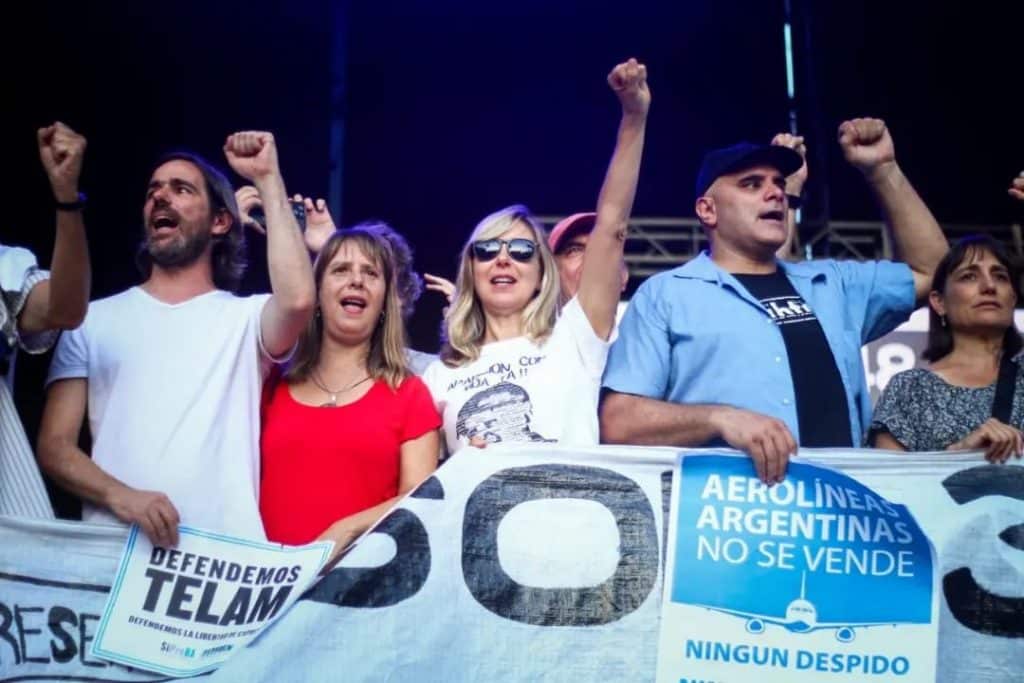
The fight for justice for the victims of state violence is not an isolated battle. The diverse sectors who took part in the March 24 mobilization — workers, students, the feminist movement, human rights organizations and the revolutionary Left — show that ensuring that the violence of the dictatorship is never repeated means fighting against the very system that produced it. The Far Right in Argentina and across the world celebrate past crimes to justify future ones. What stands in the way of this advance is not the complicity of bourgeois politicians who preserve the status quo of capitalist functioning, but the movements of the working class and oppressed organizing themselves independently and with their own methods. The success of the struggle against Milei depends on overcoming the silence of the union leaderships and uniting the struggles of the working class and social movements to expand this fight.
This takes on international dimensions as well. Milei’s government does not launch its attacks through its own will alone; it acts with the support of imperialist governments and institutions, including the United States and the organizations it controls, such as the IMF. As Myriam Bregman said in advance of the march, “Our country is under the heel of the IMF and we would like to emphasize that, without breaking with this, there is no outcome in favor of the popular and working majorities.”
In this sense, anti-imperialist struggle is inextricably tied to the fight against the Far Right, and requires the active solidarity of those fighting against imperialism here in the United States. With Milei’s policies in Argentina serving as a laboratory for far-right attacks internationally, we must demand an end to the policies of economic and military domination that pave the way for oppression and genocide across the world.
This article is adapted from an article originally published in French in Révolution Permanente.


